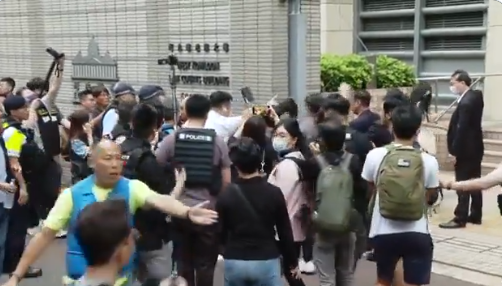On Thursday, a Hong Kong court convicted 14 pro-democracy activists in a significant national security case under a law imposed by Beijing, which has substantially curtailed public dissent in the city.
Among those found guilty of conspiracy to commit subversion were former legislators Leung Kwok-hung, Lam Cheuk-ting, Helena Wong, and Raymond Chan. They are at risk of receiving life sentences at their upcoming sentencing. However, two individuals, former district councilors Lee Yue-shun and Lawrence Lau, were acquitted.
A dramatic day in court in #HongKong as dozens of pro-democracy campaigners learned their fate in a landmark trial verdict.
45 people – convicted of “subversion” charges under the city’s national security laws – all now face a maximum sentence of life imprisonment.@bexwright1 pic.twitter.com/egvQS6FLoM
— Kristie Lu Stout✌🏽 (@klustout) May 30, 2024
This case involves 47 democracy advocates who were charged in 2021 due to their participation in an unofficial primary election. The prosecution argued that they aimed to incapacitate Hong Kong’s government and remove the city’s leader by obtaining a legislative majority that would allow them to reject budgets indiscriminately.
According to a summary distributed to media, the court stated that those involved in the election had planned to “either actively use or use the power conferred on the Legislative Council by the Basic Law to veto the budgets.” This action could lead the chief executive to dissolve the legislature. If the budget was vetoed again in a newly formed legislature, the chief executive would be forced to resign.
I spoke to @AlJazeeraWorld about today's chilling verdict in Hong Kong's largest national security case. The court's conviction of 14 people for their peaceful activism shows the utter contempt for both democratic political processes and the rule of law. pic.twitter.com/UspDRIeYMZ
— Elaine Pearson (@PearsonElaine) May 30, 2024
The detailed 319-page verdict highlighted that the plan to veto bills would severely disrupt the implementation of government policies and halt new initiatives. The judges noted that this would significantly weaken the power of both the Government and the Chief Executive, potentially triggering a constitutional crisis for Hong Kong.
The verdict also emphasized that “unlawful means” used in this conspiracy did not need to be criminal acts, and it was unnecessary for the prosecution to prove that the accused were aware of the illegality of their actions.
The court’s decision has been deferred to a later date, with no additional details provided by Judge Andrew Chan at the time.
VIDEO: Hong Kong activists Lawrence Lau and Shun Lee are acquitted in the city's landmark national security trial, as the court found another 14 activists guilty of subversion in the city's biggest case against the pro-democracy bloc since China imposed a national security law. pic.twitter.com/8Lgk4gZ2tR
— AFP News Agency (@AFP) May 30, 2024
Lawrence Lau, who was acquitted, expressed to the media that the focus should be on the other defendants, noting that the judgment itself should be considered “the star” of the case for setting out the judges’ logic and perspectives as part of the rule of law. He mentioned that he had not advocated for budget vetoing during his campaign, leading to his acquittal.
Lee Yue-shun, also found not guilty, thanked the public for their support over the years and described the judgment day as akin to a “special graduation ceremony.”
Observers have commented that this case illustrates how the security law is being used to suppress political opposition, which has been a growing trend since large anti-government protests in 2019. Despite this, both the Beijing and Hong Kong governments claim that the law has restored stability to the city while maintaining judicial independence.
Since the introduction of the national security law in 2020, Hong Kong’s authorities have drastically limited free speech and assembly, leading to the arrest, silencing, or self-exile of numerous activists. Several civil society organizations have also disbanded.
Notably, Benny Tai, Joshua Wong, and a dozen other former lawmakers were among those prosecuted, with many pleading guilty to conspiracy to commit subversion and awaiting sentencing.
As this legal saga continues, international and local observers remain deeply concerned about the implications for Hong Kong’s political landscape and its promises of maintaining Western-style civil liberties post-handover from Britain in 1997.
Major Points
- A Hong Kong court convicted 14 pro-democracy activists on charges of conspiracy to commit subversion under a national security law imposed by Beijing, which has greatly restricted public dissent.
- The accused include former lawmakers such as Leung Kwok-hung and Lam Cheuk-ting, who now potentially face life in prison. Two former district councilors were acquitted.
- These activists were charged for their participation in an unofficial primary election aimed at obtaining a legislative majority to veto government budgets, which the court claimed could paralyze the government and lead to a constitutional crisis.
- The court’s verdict emphasized that “unlawful means” used in the conspiracy did not have to be criminal acts and that the accused did not need to be aware of the unlawfulness.
- The case is seen as an example of how the national security law is being used to suppress political opposition and erode civil liberties in Hong Kong, despite promises of maintaining Western-style freedoms after the 1997 handover from Britain to China.
Susan Guglielmo – Reprinted with permission of Whatfinger News



